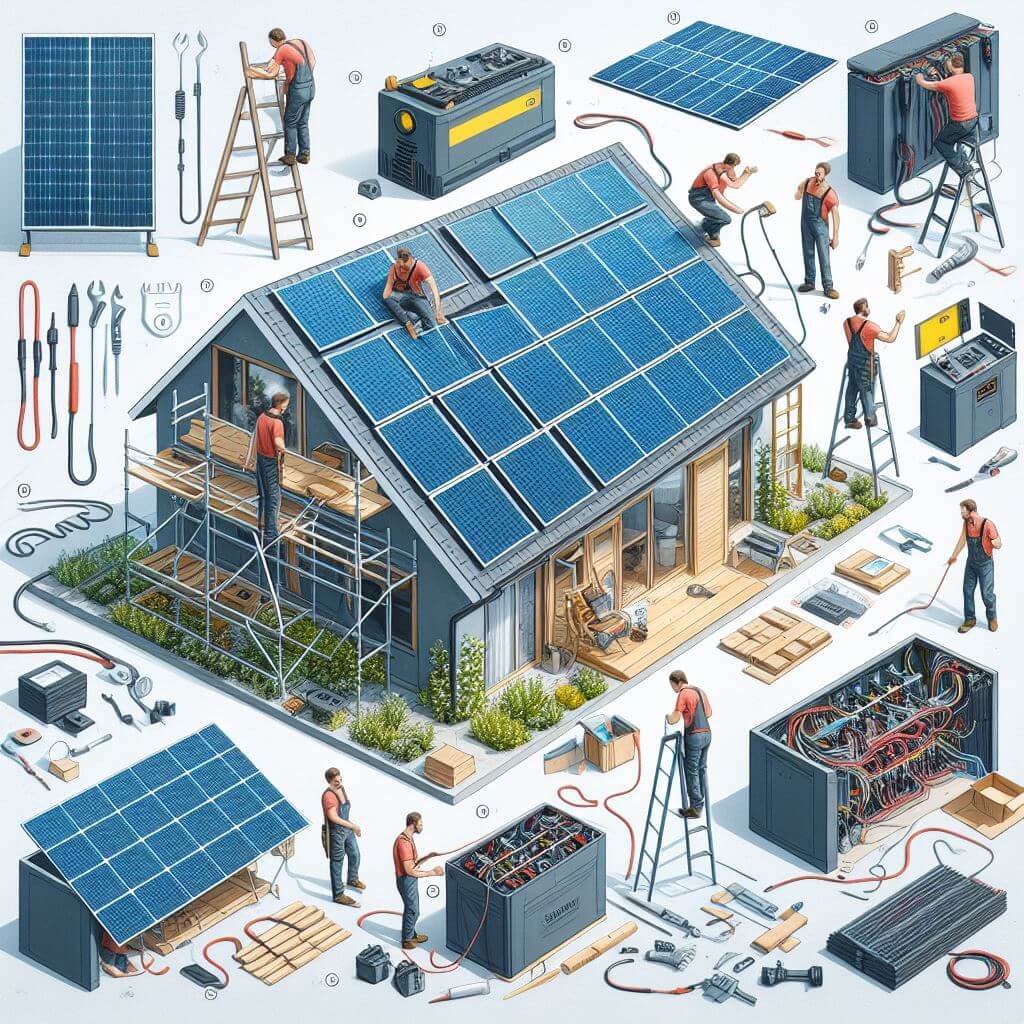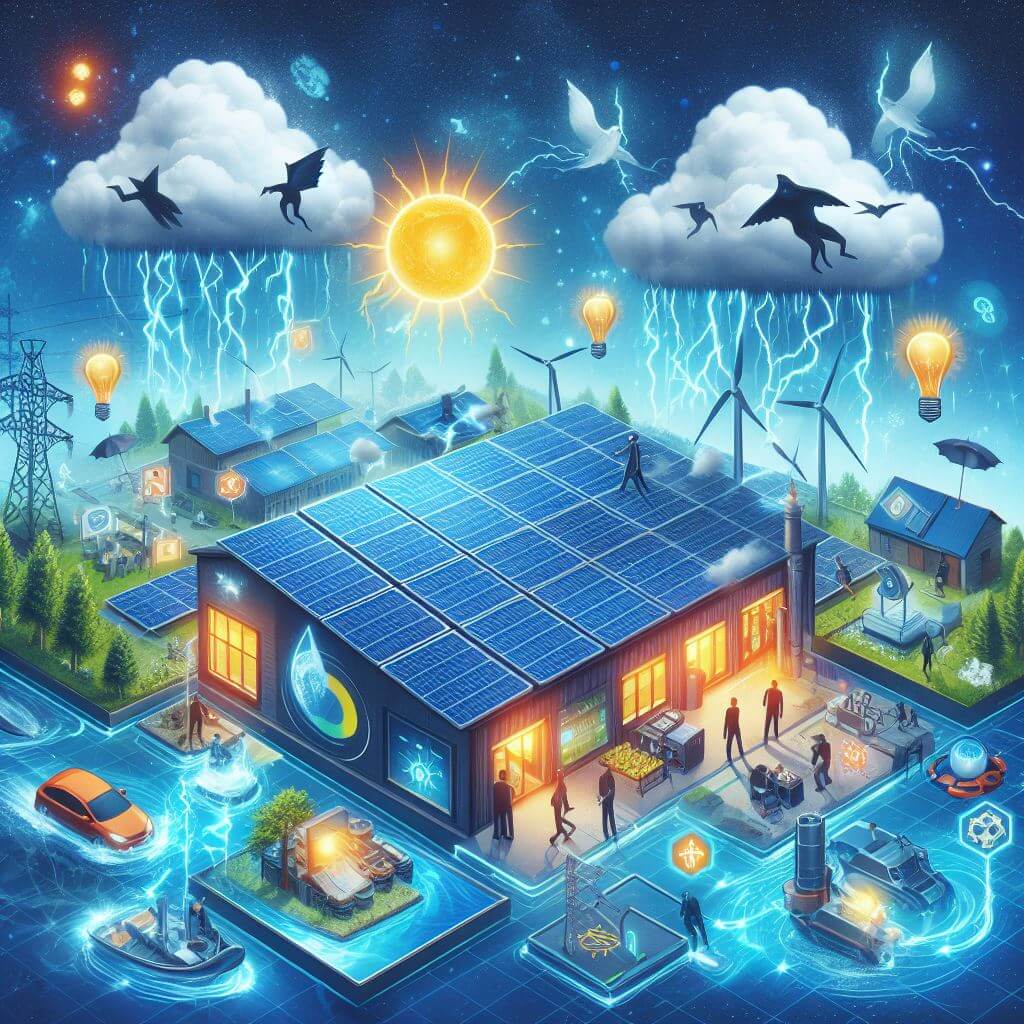- Home
- How to Use Solar Energy At Home
- How to Use Solar Panels During a Power Outage
How to Use Solar Panels During a Power Outage: A Comprehensive Guide
When the electric grid falters, and downed power lines are in sight, my solar panels work during a power outage to keep my food cold and my home’s electricity running. As the power company dispatches utility workers fixing the infrastructure, I rely on my solar inverter to manage the DC electricity my panels produce.
Grid-tied solar systems usually draw electricity from the grid, but during peak demand and outages, these systems automatically shut off. To maintain resilience, some homeowners opt for an off-grid setup to guarantee access to power from their solar panels, even when grid power is unavailable.
Installing an off-grid solar system is a safeguard against natural disasters, ensuring that my essential appliances, like my air conditioner during extreme heat, stay on. While grid-tied systems generate free electricity and can export excess electricity back to the grid, they're not helpful when the system is connected to the grid during an outage.
But with off-grid systems, I can manage my power usage to keep critical devices running, especially since the battery capacity determines how long I can sustain my energy needs without sunshine.

Understanding Solar Panel Functionality in Blackouts
During blackouts, the utility company can't supply power, but my solar panels connected to an inverter still harness sunlight to provide energy. This setup allows me to use clean energy even when the rest of the neighborhood is in the dark..
Grid-Tied vs Off-Grid Solar Systems
Grid-tied solar systems offer savings by using renewable energy when the utility company's power is flowing. Yet, for complete energy independence, off-grid solar systems are the go-to, as they're not affected by utility company outages.
Grid-Tied Limitations During Outages
My grid-tied system's solar inverter is designed to protect utility workers by shutting down during outages, preventing energy from being sent back to the grid. This safety feature ensures that my system doesn't accidentally energize the grid and pose a hazard.
Off-Grid Autonomy and Resilience
Without relying on the utility company, my off-grid solar systems provide renewable energy consistently. This autonomy is crucial for resilience, as I can maintain power regardless of grid outages, making me self-sufficient in my energy needs.
The Necessity of Battery Storage
Solar batteries are vital for an energy storage system, ensuring that my solar panels during a power outage can keep vital devices like medical devices running. The storage capacity of my solar energy storage system and how long the battery lasts depend on my energy consumption.
Sizing Your Battery Backup System
Choosing the right solar power battery for my battery backup systems means calculating the stored energy to power my home during an outage. This energy backup is a balance between my power needs and the capacity of the system.
Maintaining Power with Solar Batteries
Even without grid power, my solar batteries provide the necessary electricity to keep my home running smoothly. They store the energy produced during the day for use anytime, especially during unexpected power cuts.
Preparing Your Solar Setup for Outages
To ensure I'm prepared, my off-grid solar systems are paired with a battery-backed solar system. This combination allows my solar panels during a blackout to continue providing power without interruption.
Solar Power Invertersur Gateway to Energy Independence
A robust inverter is crucial, as it needs to protect utility workers by safely managing the energy flow between my home and the grid during maintenance or emergencies.
Does Your Inverter Support Blackout Operation?
My inverter is designed to automatically disconnect from the grid during outages. This feature is essential to safely isolate my home from the grid and continue supplying power from my solar panels.
Choosing an Inverter for Solar Panel Efficiency
My solar panels are connected to an inverter that maximizes their efficiency, converting sunlight to usable electricity for my home, and ensuring that I get the most out of my investment, even during outages.
Assessing Solar Panel and Battery Capacity Needs
Working with solar installers, I've determined my solar battery storage needs to provide clean energy consistently. The right solar battery system is key to meeting my solar installations' potential.
Calculating Energy Needs for Essential Appliances
In the face of extreme weather, I've calculated the energy supply needed for my electrical appliances. Utility companies can't always meet the high demand for electricity, so my energy backup is sized to power my equipment and appliances based on consumer demand.
Understanding Solar Panel Output in Emergencies
My solar battery storage system is a pillar of clean energy supply during emergencies. It ensures that I have a reliable power source when the grid fails, keeping my family and home safe and functional.
Optimizing Solar Energy Use During Power Outages

When the sun is shining, I can harness solar energy even during a power outage. With a bit of preparation and knowledge about my solar panels, I can keep my home running without relying on the grid.
Prioritizing Appliance Use with Solar Power
During outages, it's crucial that I prioritize which appliances to power. This ensures my energy supply is used efficiently for the most important needs first.
Essential vs. Non-Essential Appliances
I know that my energy supply is limited during an outage, so I focus on essential appliances like the fridge and lights. Non-essential devices, like my gaming console, can wait until the grid is back.
Managing Energy Consumption Wisely
By using renewable energy from my solar generators, I can convert sunlight into electrical energy to power my home. I make sure to manage this energy wisely to keep essential systems running.
Keeping Your Solar Panels at Peak Performance
It's my job to keep my solar panels working well, so they're ready for any outage that comes my way.
Routine Maintenance Tips
I regularly clean my solar generators to ensure they perform at their best. I also check for any damage or wear that could affect their efficiency.
Monitoring Solar Panel Health
To make sure I'm getting all the energy my panels can provide, I keep an eye on their condition and performance, especially before storm seasons.
Solar Power Backup Options
For backup power, I explore different solar options to find the best fit for my energy needs and budget.Portable Solar Generators:
A Versatile Solution
In the face of extreme weather, portable solar generators can power electrical appliances, providing energy supply when utility companies can't.
Advantages of Portable Solar Options
Portable solar options offer independence from utility companies and a dependable energy supply, making them a smart choice for emergency preparedness in extreme weather.
Key Features to Look For
When choosing backup generators, I look for ones with high-capacity solar batteries to ensure I have enough power for emergencies.
Home Energy Storage Showdown
In the search for the best home energy storage, I'm considering all my options, including the Tesla Powerwall.
Tesla Powerwall: Cutting-Edge Innovation
The Tesla Powerwall is a game-changer with its sleek design and ability to store energy efficiently, providing me peace of mind during outages.
SolarEdge Home Battery: Reliable Energy Storage
While the Tesla Powerwall is impressive, I also look at other reliable options like the SolarEdge Home Battery for my energy storage needs.
More about how to use solar energy at home
Legal and Regulatory Considerations
I make sure to stay informed on local solar regulations to ensure my setup complies with all laws and maximizes its potential benefits.
Navigating Local Solar Restrictions and Capacity Limits
When I plan to use solar panels during a power outage, I always check my local regulations first. Different areas have specific rules about solar panel installation and use, especially during blackouts.
These can include restrictions on system size and whether I can even operate my panels when the grid is down. It's important to be aware of these to avoid fines and ensure that my system is legal and effective.
Understanding Your Area's Solar Policies
Before I invest in solar panels, I take time to understand the solar policies in my area. This means looking into permits, interconnection standards, and any net metering policies that could affect how I use my solar energy during outages. It's crucial to work within these guidelines to optimize the use of my solar panels when the grid fails.
Choptank Case Study: Solar in Parsonsburg, MD
In Parsonsburg, MD, the Choptank Electric Cooperative ran a pilot program allowing solar panels on their grid. This case study showed me the importance of cooperative initiatives in expanding solar usage and how local policies impact the adoption of solar energy, especially for maintaining power during outages.
Making the Most of Your Solar Investment
My solar panels are more than just an environmental choice; they're a financial investment. By understanding how to properly use and maintain them, especially during power outages, I can ensure that they provide a consistent return on investment through energy savings and increased home value over time.
Economic Benefits of a Solar-Ready Home
Having a solar-ready home has proven to be economically beneficial. Not only does it cut down on my electricity bills, but it also prepares me for power outages without relying on the grid, saving me from potential costs associated with blackout-induced losses.
Reducing Electricity Bills with Solar Power
By converting sunlight into electrical energy, my solar panels significantly reduce my monthly electricity bills. During a power outage, they can continue to supply energy, provided I have the right setup, which means I'm not affected by peak rates or power surges when the grid comes back online.
Adding Value to Your Property
Installing solar panels has added value to my property. Potential buyers often view a solar-equipped home as a modern, energy-efficient choice. In case of a power outage, the assurance of uninterrupted power can be a significant selling point.
Harnessing Renewable Energy for Emergencies
Renewable energy like solar power plays a critical role in my emergency preparedness plan. Solar generators are a key component in ensuring I have sustained power during outages. They are efficient, quiet, and, most importantly, allow me to remain operational when traditional energy sources fail.
The Environmental Impact of Solar Energy During Outages
During outages, my battery storage system ensures that my solar energy storage remains a green solution. The system produces clean energy that I can rely on, reducing my dependence on fossil fuels and minimizing my environmental impact.
Contribution to a Greener Future
Each time I use solar power during an outage, I contribute to a greener future. This sustainable approach supports renewable energy advancement and demonstrates the practical benefits of solar technology in emergency situations and everyday life.
Reducing Carbon Footprint with Solar Power
Using solar power, especially during outages, helps me reduce my carbon footprint. It eliminates the need for backup generators that run on gas or diesel, and ensures that my emergency power supply is as environmentally friendly as my day-to-day electricity use.
Empowered by the Sun: Staying Lit When the Grid Goes Dark
When the power goes out, it's my solar panels that keep the lights on and my appliances running. They're like silent guardians that soak up the sun's energy, ready to spring into action when the grid fails.
It's a comforting thought, knowing that even during a blackout, my home can still buzz with life, thanks to the power stored from my rooftop. The key is to have everything set up before an emergency hits, so I can keep my family's world spinning even when the rest of the neighborhood is at a standstill.